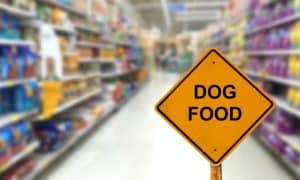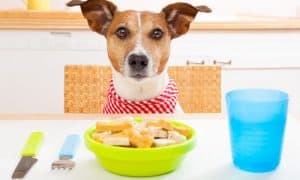“This post contains affiliate links, and I will be compensated if you make a purchase after clicking on my links.”
Staring down the extensive pet food aisle in your local grocery or pet supply store can be a bit overwhelming… how do you pick the right food for your dog?! Many of us think that the dog food manufacturers have our pets’ health and vitality in mind when packaging foods, stamping “Complete Nutrition!” on the cover with some flashy graphics and images of healthy meats and vegetables. Well, think again. Your dog relies on you to provide him with a healthy, nutritious diet. It’s time to learn the truth about dog food, so you can make the right choices for your pet.
We found a great article from Dogs Naturally Magazine that lists 10 important facts you may not know about what you’re feeding your four-legged friends.
The Truth About Dog Food
40% of dogs are obese. 46% of dogs and 39% of cats now die of cancer. Heart, kidney and liver disease are epidemic. Like people, dogs are what they eat. Save your dog a lot of suffering, and save yourself a fortune in vet bills, by learning the truth about your dog’s diet. Here are 10 important things you may not know about what your dog is eating:
1) Commercial dog food is “fast food.”
Heavily-processed fast foods (burgers, fries, tacos, etc.) as a big diet component can cause major health problems in people. How can fast foods be good for dogs? Only dog food manufacturers think this nonsense makes sense. Dogs and people share roughly 75% the same genetic makeup, and we have similar nutritional needs. What we’re doing to our own health with processed foods, we’re also doing to our dogs. And it’s happening faster.
2) People food is good for dogs.
Despite what you’ve heard from friends, vets and pet food manufacturers, wholesome ”people food” is good for dogs. People food is only bad for dog food makers. The same fresh, nutritious foods people eat can offer your dog the nutrition he needs and save you a mountain of vet bills. It just takes a little education to learn the small differences between human and canine nutritional needs. (Hint: no onions, grapes or raisins. Rinse off rich spices and sauces. Go easy on carbs and avoid wheat and corn.)
3) Don’t presume the food your vet sells is a superior product.
Veterinarians, like medical doctors, learn relatively little about nutrition in school. Much of what they do learn comes directly from pet food company vets, sales reps, articles, studies, and seminars. If your vet hasn’t studied and experimented on his or her own with raw or homemade diets, it’s unlikely that he or she knows bad food from good, and may be acting on outdated information or superstition. And if vets profit from selling one brand, and not another, they have a conflict of interest that may influence their opinions. (Some may even be prohibited by a manufacturer from selling more than one brand.)
4) The quality of processed commercial foods is suspect.
Dog food may legally contain “4-D” meat: meat from dead, dying, diseased and disabled animals. Add a little road kill, mill floor sweepings labeled as grain, and corn contaminated with high levels of pesticide (yes, really) and you have a recipe for ill health. The cheaper the food, the cheaper the ingredients, the worse the nutrition. Read the labels!
5) Kibble does not clean teeth.
Almost all dogs age three and over have dental diseases. Most of these dogs eat kibble. That should tell you something. Although a small study once suggested that kibble might clean teeth better than canned food, better doesn’t mean effectively. Hoping to avoid brushing our dog’s teeth, we too willingly grasp at kibble’s unsubstantiated health benefits. But pretending that kibble or hard treats will keep teeth clean will only lead to huge vet bills, lost teeth and much canine suffering.
6) “Complete and balanced” does not mean “optimum.”
“Complete and balanced” means that a food meets minimal theoretical health requirements for the average dog. Food boasting that it conducted Feeding Trials often just test only the lead product in a line of foods. Trials, too, are for only a small number of dogs for a short period of time. Over time, nutrient and enzyme deficiencies are inevitable. Of course, complete and balanced is better than not complete and balanced, but again, better does not mean good.
7) Feeding the same food day after day limits nutrition.
Imagine eating corn, rancid fat and chicken wings (without meat) every meal of your life, with the same mix of cheap vitamins and minerals added. Nutritionists urge people to eat a variety of foods, both for improved nutrition and also to prevent allergies. Dogs need variety, too. But variety can cause gastrointestinal upset in dogs, right? In the short run, yes. Nutritionally-deprived animals have sick guts. In fact, intestinal upset when switching foods is a sign your dog needs more variety. Once good nutrition has healed a dog’s digestive system, the dog can eat different foods every meal — just as people do. Just switch foods gradually over several weeks while your dog’s gut heals.
8) Kibble is not better than canned.
Whereas canned food is preserved by the process of canning, most kibble is preserved artificially. (Ever contemplate how much preservative must be required to retard spoilage of food left out all day?) Kibble begins as a dry cooked meal whereas canned food is canned fresh. Kibble is exposed to more heat than canned (destroying nutrients). Worse yet, kibble is linked to kidney and bladder problems in cats, and to bloat, a deadly problem especially for large, broad-chested dogs. It’s also dehydrating. Of course, canned isn’t perfect either. Fresh is best, raw or cooked. Next best is frozen prepared food and then dehydrated and freeze dried foods, all available at better pet stores.
9) Some common foods can be hazardous to canine health.
Cooked bones and rawhide chews can cause major health problems requiring emergency surgery. Wheat-based treats can bring on allergies. Onions, grapes, raisins, chocolate, the article sweetener Xylitol and other common foods can be toxic for dogs and must be avoided.
10) Corn kills.
Most kibble is loaded with corn, a cheap filler. Unfortunately, the corn isn’t the luscious kind you and I eat. It’s feed corn (like cattle eat), or cheap feed corn remnants. Even corn meal dust counts as corn. The corn may even have been condemned for human consumption, there being no upper level of pesticide contamination for pet foods. If that weren’t bad enough, corn (which gives us both high fructose corn syrup and corn oil) is fattening. Any wonder so many dogs are obese and suffer from diabetes?
Read more here. Did any of these truths about dog food surprise you? Do you agree or disagree with any of these truths? What surprised you the most? Tell us your thoughts below.



















rich seldner
Jul 30, 2012 at 8:07 am
In this article you say fresh meat RAW or cooked is best. In another article you say fresh meat may contain e. coli or salmanella causing vomitting or diahrea. Which article do I trust?